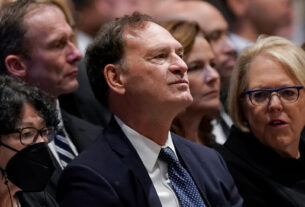More than 30 miles of anti-scale fencing are being erected all over the nation’s capital. Concrete barriers are being placed at key junctures. Certain roads have already been closed to traffic. Surveillance drones will flood the skies.
But if Washington looks like a war zone again, it does not necessarily feel that way. Unlike the last time President-elect Donald J. Trump took the oath of office eight years ago, the bristling tension and angry defiance have given way to accommodation and submission. The Resistance of 2017 has faded into the Resignation of 2025.
The mood leading up to the second Trump inauguration reflects how much has changed since the first Trump inauguration. Much of the world, it seems, is bowing down to the incoming president. Technology moguls have rushed to Mar-a-Lago to pay homage. Billionaires are signing seven-figure checks and jockeying for space at the inaugural ceremony. Some corporations are pre-emptively dropping climate and diversity programs to curry favor.
Some Democrats are talking about working with the newly restored Republican president on discrete issues. Some news organizations are perceived to be reorienting to show more deference. The grass roots opposition that put hundreds of thousands of people in the streets of Washington to protest Mr. Trump just a day after he was sworn in back in 2017 generated a fraction of that in their sequel on Saturday.
“Hashtag-resistance has turned into hashtag-capitulation,” said David Urban, a longtime Republican strategist and Trump ally. “The pink-pussy hats are gone, and they’re replaced by MAGA hats worn by Black and brown people.”
The determined protesters who did turn out for Saturday’s People’s March said they refused to give up, but some sympathized with those who expressed exhaustion by Mr. Trump’s latest victory.
“Why do we have to keep doing this?” asked Lisa Clark, 65, from Akron, Ohio, who also attended the Women’s March in 2017. “But hey, we will. We’ve been here before, and we’ll be here again if we have to be.”
For both the progressive left and the Never Trump right, this second inauguration has upended all the assumptions after eight years of fighting Mr. Trump. Their strategies and messaging failed to keep him out of power. And many of them have grown drained and demoralized.
“Democratic leaders have learned that focusing all of the energy on one man failed to make the difference,” said Donna Brazile, a former Democratic National Committee chairwoman. “It’s a bitter pill to swallow, but it’s not the end. We shall rebuild. The resistance to Trumpism will never go away, but will show up differently during Trump 2.0.”
For the Trump team, on the other hand, it is a moment of triumph and celebration. After Mr. Trump left office four years ago defeated, impeached twice and facing the prospect of multiple criminal investigations, it hardly seemed likely that he would be moving back into the White House four years later. So for his camp, this weekend brings a sense of justice.
And this time, Mr. Trump arrives at 1600 Pennsylvania Avenue not as a fluke Electoral College winner who fell short in the popular vote. He takes the oath on Monday with a burst of momentum propelled by a victory in the popular vote, albeit with one of the smallest margins of victory since the 19th century rather than the landslide he claims.
“If you’re somebody who was there in 2015, 2016, 2017, and you’re here today, you feel vindicated,” said Mr. Urban.
Some of the deference being shown to Mr. Trump now by the political, media and corporate worlds stems from a broader sense that perhaps popular opinion is more on Mr. Trump’s side than they had assumed. Perhaps, in this view, Mr. Trump, however imperfect, has grasped something important by suggesting that the country needs to fundamentally rethink some of its embedded ways of doing things.
A new survey released Saturday by The New York Times and Ipsos found that even many Americans who dislike Mr. Trump agree with some of his diagnosis of the country’s problems and some of his signature policy prescriptions, including the mass deportation of undocumented immigrants.
And so dispirited opponents face a period of introspection before they return to the arena. “The humbling reality of a popular vote victory for him requires a lot of self-reflection and inward looking,” said Patrick Gaspard, president of the Center for American Progress, a progressive research group.
The mood on the eve of this second inauguration is different, he said, because progressives were stunned when Mr. Trump beat former Secretary of State Hillary Rodham Clinton in 2016 but not so surprised when he beat Vice President Kamala Harris in November.
“The activist response comes usually from a shock to the body — something happens, people are stunned by it or bewildered by it or outraged by it, and this visceral reaction takes place that metastasizes,” Mr. Gaspard said. ”That usually comes from shock. There’s nothing that’s happened here has been shocking.”
Indeed, he added, President Biden’s political troubles and his insistence on running for a second term had long ago drained energy from supporters. “For the center-left, we’ve been having a slow-moving train wreck that we could see for a long time coming,” Mr. Gaspard said. “From the minute that Joe Biden announced he would run for a second term, you could sense in our big tent and coalition an immediate deflation take hold.”
While the resistance rethinks its approach, the powerful are cozying up to the returning leader. The eagerness of tech tycoons like Jeff Bezos and Mark Zuckerberg to court Mr. Trump may not reveal any newfound personal affection for the incoming president but certainly underscores their analysis of the shifting tides of society and their calculation of the best way to protect themselves from a volatile, revenge-minded leader. Companies that have abandoned diversity, equity and inclusion policies without even being asked are anticipating where the future lies.
As he takes office again, Mr. Trump has discovered that he does not even have to take action to force his adversaries to adapt, back down or bend in his direction in a strategy of self preservation. He is already getting his way just by being himself.
News networks are shaking up their lineups, editorial pages are recasting their attitudes at the behest of wealthy owners and corporate media parent companies are settling lawsuits with Mr. Trump or considering doing so. Mr. Zuckerberg’s Meta abandoned fact-checking in a nod to a fact-challenged president.
Unlike his predecessor, James B. Comey, in Mr. Trump’s first term, Christopher A. Wray, the F.B.I. director, did not wait to be fired but resigned on his own accord. The special counsel Jack Smith did not wait to be ordered to abandon his investigation of Mr. Trump but preemptively did so on his own.
Democrats like Senator John Fetterman of Pennsylvania and Gov. Gretchen Whitmer of Michigan are preaching the virtues of cooperation. Seven congressional Democrats who boycotted Mr. Trump’s 2017 inauguration told Politico they would attend this one. Republicans who sometimes stood up to Mr. Trump at the start of his first term are now bending over backward to confirm nominees they privately disdain.
At the same time, beneath that wave of acquiescence is a current of fear in Washington. Many of those threatened with retribution by Mr. Trump are spending this weekend dreading what is to come. An F.B.I. under the control of Kash Patel, the pro-Trump warrior awaiting confirmation by the Senate, could become the bureau of revenge. Mr. Patel in a book he wrote published a list of 60 people he considers “deep state” actors to be targeted and has vowed to “come after” the news media for what he considers their lies.
The anticipation has changed the environment. Some critics who were once vocal in speaking out against Mr. Trump are staying off television, not posting on social media and declining to speak to reporters on the record to avoid attracting his attention. If they keep low, they reason, it is possible he will not come after them.
But pockets of resistance in Washington remain. Sarah Longwell, a Republican political strategist who is now publisher of The Bulwark, a conservative online publication and refuge of the remaining Never Trumpers, said that she has found there is “an enormous appetite” for heterodox views, “as more and more people capitulate.”
One reason Washington feels different at the dawn of the next Trump term, she said, is that this time he is a lame duck who under the 22nd Amendment to the Constitution cannot run again — although from time to time he makes jokes, if they are jokes, about finding a way to stay in office even after four years.
“There are a million reasons why it’s different,” Ms. Longwell said, “but no one is trying to gear up to beat Trump out of a second term. They’re trying to figure out how to constitute themselves, how to win again in two years and four years.”
In some ways, she said, it is now a question not of just warring with him but waiting him out: “People are just thinking, how do you endure for the next four years?”
Aishvarya Kavi contributed reporting.





